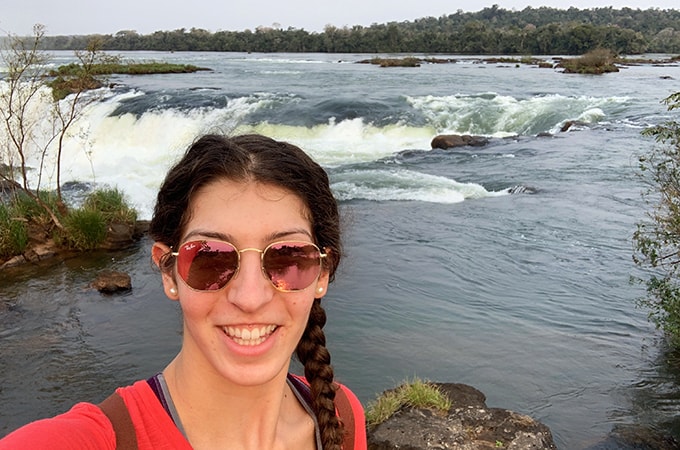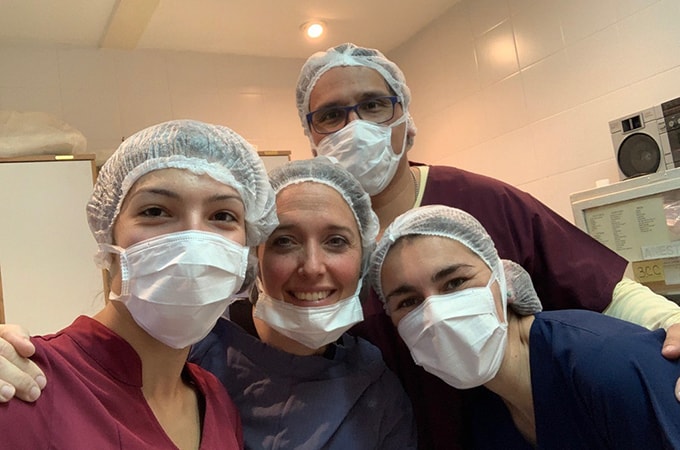Students learn and connect with others through service, despite pandemic
A student shares her virtual service-learning experience with El Salvador CRISPAZ
As COVID-19 led many universities—including Loyola—to have a virtual fall semester, I thought about ways that I could make a difference volunteering while studying remotely from Huntington, N.Y.
The opportunity to participate in service-learning for the El Salvador CRISPAZ organization came about through my Writing for the Web and Social Media course (WR305).
My professors at Loyola have best prepared me for this unique semester. Their constant encouragement to continue pursuing my dreams, both prior to and during this year, empower me in my studies and toward my future career path.
I was initially drawn to this class because of the prominent role Web writing and social media plays in our everyday lives. Most information and news are consumed by clicking and scrolling through websites and social platforms. This course appealed to me because I wanted to enhance my own Web writing skills, especially as Web users continuously increase their reliance on social media due to the pandemic.
I was interested in the service-learning component of the course because I love to travel and learn about different cultures. In 2019, I received the Jennings Fellowship through Loyola to participate in a three-week Latin American Hospital Immersion Program in Argentina. My experiences shadowing physicians and exploring a new culture heightened my interest to volunteer for communities in need. Based on my time in Argentina, serving a community in El Salvador and working with a group such as CRISPAZ appealed to my interests, despite the pandemic’s travel restrictions.

 Francesca Minicozzi taking in the sights at the Iguazu Falls in Argentina (left). The team of pediatric ophthalmologists Francesca Minicozzi shadowed in Cordoba, Argentina (right).
Francesca Minicozzi taking in the sights at the Iguazu Falls in Argentina (left). The team of pediatric ophthalmologists Francesca Minicozzi shadowed in Cordoba, Argentina (right).
CRISPAZ, or Christians for Peace in El Salvador, is a non-profit, faith-based organization that aims to unite the church of the poor and marginalized communities in El Salvador with communities in other countries such as the United States, Canada, and Australia. Prior to the pandemic, Loyola students participated in a Spring Break Immersion Program in El Salvador. However, due to COVID-19, Loyola’s partnership with CRISPAZ is now remote; thus, the Web writing collaboration emerged.
My work with CRISPAZ this semester has consisted of collaborating with their leadership, including the executive director, delegation program coordinator, and communication coordinator. Through our meetings, we have established revision guidelines for the CRISPAZ website. The CRISPAZ site appeals to two main groups: donors and prospective volunteers, whether that is in-person or through a virtual e-encounter.
As part of the WR305 service-learning team, I have conducted usability testing in which my classmates and other participants have navigated the CRISPAZ website. An analysis of the data assembled from the usability testing will be completed at the end of the semester. The data analysis will give better insight into revision suggestions for the CRISPAZ site. These suggestions aim to improve the accessibility of the CRISPAZ site content, making it as user-friendly and easy to navigate as possible.
Something I will take away from this experience is that despite social distancing guidelines, COVID-19 has not hindered service-learning opportunities.
One of the (obvious) challenges with virtual service-learning is that I cannot experience what the typical international immersion experience would be like if I had the opportunity to travel to El Salvador myself. Although video conferencing allows me to connect with and get to know the CRISPAZ team, I cannot experience what volunteering in El Salvador is like firsthand.
However, the CRISPAZ website uses an e-encounter feature to showcase to prospective volunteers what service immersion would normally look like. The virtual encounter also provides participants with a history of El Salvador, connecting its history to CRISPAZ’s values of justice, peace, and solidarity. I think this virtual opportunity is beneficial for volunteers who are curious about the immersion experience. By collaborating with CRISPAZ, my service-learning team is working toward making CRISPAZ’s website the most engaging as possible to attract volunteers for future in-person excursions.
Something I will take away from this experience is that despite social distancing guidelines, COVID-19 has not hindered service-learning opportunities. Today’s technology allows me to apply my passion for service and cultural immersion by connecting with the CRISPAZ organization. I can connect from my home in New York to their office in El Salvador with just a few clicks on my computer. In this way, I feel connected to my peers, to my professors, and to the CRISPAZ organization through our constant communication through email and Zoom video conferencing. In addition, my peers and I have turned to Google Docs to collaborate on our reports that we present to CRISPAZ.
I also believe my professors at Loyola have best prepared me for this unique semester. Their constant encouragement to continue pursuing my dreams, both prior to and during this year, empower me in my studies and toward my future career path. I am thankful for their continuous support, as they have taught me to become more resilient and appreciative of the world around me.